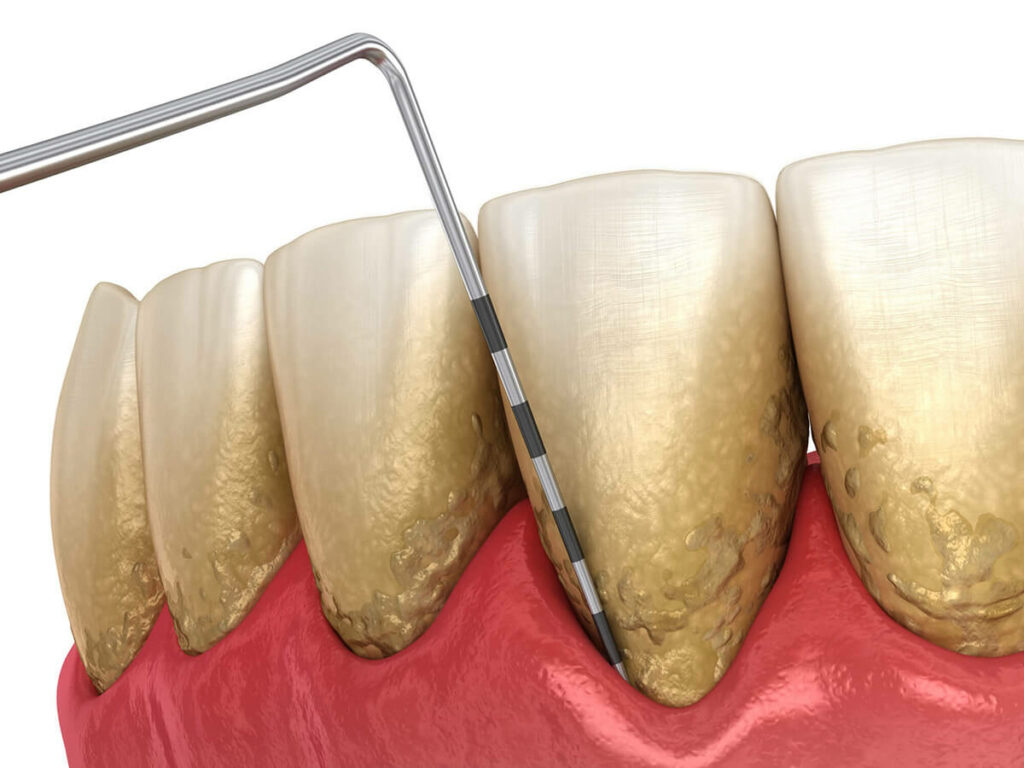Periodontal Disease Treatment
Periodontal disease (gum disease) is a serious condition that can affect anyone. Our dental practice offers comprehensive periodontal services that address all stages of gum disease and help restore your oral health.
Periodontal Disease Treatment in Hyde Park and West Roxbury
Periodontal disease, gum disease and periodontitis all refer to an infection affecting the gums (gingiva) and the bone surrounding your teeth. Healthy gums and supporting structures are crucial for keeping tooth roots secure, so it’s important to detect and address signs of periodontitis early.
The initial stage, known as gingivitis, often presents with mild symptoms like redness, swelling or light bleeding. If left untreated through proper daily oral hygiene and professional cleanings, the infection can spread to the connective tissues, causing irreversible damage to the supporting structures.

-
What are the signs of periodontal disease?
The earliest indication of periodontitis is irritation along the gumline, which may cause discomfort or bleeding during brushing, flossing, or professional cleanings. If untreated, the gums can start to recede, pulling away from the teeth and forming spaces called periodontal pockets. These pockets can quickly accumulate harmful bacteria and debris. To assess the severity, your dentist will measure the depth of these pockets and determine the appropriate treatment. If the disease progresses to the jawbone and the connective tissues of the teeth, it can lead to bone deterioration and eventual tooth loss.
Common Symptoms of Periodontal Disease:
- Gum recession
- Teeth appearing longer
- Loose or mobile teeth
- Pain or discomfort when chewing or biting
- Gaps forming between teeth
- Deep pockets between the gums and teeth
- Bone loss visible on X-rays
- Excessive tartar buildup
- Persistent bad breath
- Bleeding during brushing or flossing
- Red, swollen gums
Note: Periodontal disease symptoms may differ for patients who smoke, vape or use tobacco. Tobacco use can mask signs of gum disease, making the tissues appear healthier than they are.
-
How is periodontal disease treated?
Periodontal disease is typically treated using one of two methods, depending on its severity.
Scaling and root planing is the standard treatment for early to moderate stages of periodontitis. This procedure effectively manages the condition and can reverse its harmful effects. During this treatment, your dentist will clean below the gumline and between the teeth to remove plaque, tartar, and harmful bacteria. The root surfaces are then smoothed to discourage future buildup. This process promotes healing, allowing the gums to reattach to the teeth.
The second treatment, bone grafting, is necessary when the infection has reached the jawbone, causing deterioration. In this procedure, your dentist surgically accesses the damaged bone and uses proteins or artificial bone-like materials to regenerate lost bone. This encourages new bone growth and strengthens the jawbone, often making it capable of supporting dental implants to replace missing teeth.
-
How do I know if I have periodontal disease?
Early indicators of periodontal disease include red, swollen gums; bleeding during brushing or flossing; and untreated gingivitis. In more advanced stages, signs can include tooth loss and exposed tooth roots. If left untreated, periodontitis can progress and ultimately result in tooth loss.
-
What causes gum disease?
There are three common causes of gum disease. The most frequent is chronic periodontitis, which develops when poor oral hygiene allows bacteria to accumulate beneath the gumline, eventually hardening into tartar. Tartar cannot be removed with regular brushing and flossing and requires professional cleaning. If untreated, this leads to gum inflammation, damage and bone loss.
The second cause is aggressive periodontitis, which is thought to have a genetic link, as it tends to occur in certain families. This type progresses rapidly and can even affect children.
The third and rarest cause is necrotizing periodontal disease, which typically affects individuals with immune deficiencies or chronic illnesses. It results from reduced blood flow to the gums, leading to compromised soft tissue and bone.
-
What is gum recession?
Gum recession is a condition in which the gum tissue surrounding the teeth pulls back or wears away, exposing more of the tooth or its root. This can lead to sensitivity, increased risk of tooth decay and potential damage to the supporting structures of the teeth. Gum recession affects about half of Americans over the age of 50, but younger individuals can experience it as well.
Treating Gum Recession
If you notice that a tooth appears longer than usual or you feel sensitivity or pain while brushing or flossing, it may be a sign of gum recession. Schedule a visit so one of our doctors can assess the issue. If recession is present, a small graft from your palate can be used to cover the receding area. This procedure helps protect the tooth from further damage and can be performed on a single tooth or multiple teeth, depending on your needs. It’s a minor treatment designed to restore gum health effectively.
Questions about periodontal disease?
Contact us today with any questions about gum disease or if you believe you need periodontal treatment. We offer this treatment as well as various other preventative, restorative and cosmetic dental services at our Hyde Park and West Roxbury locations.
